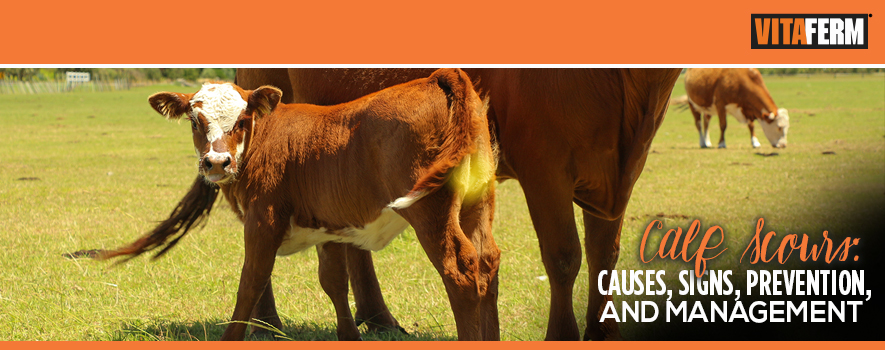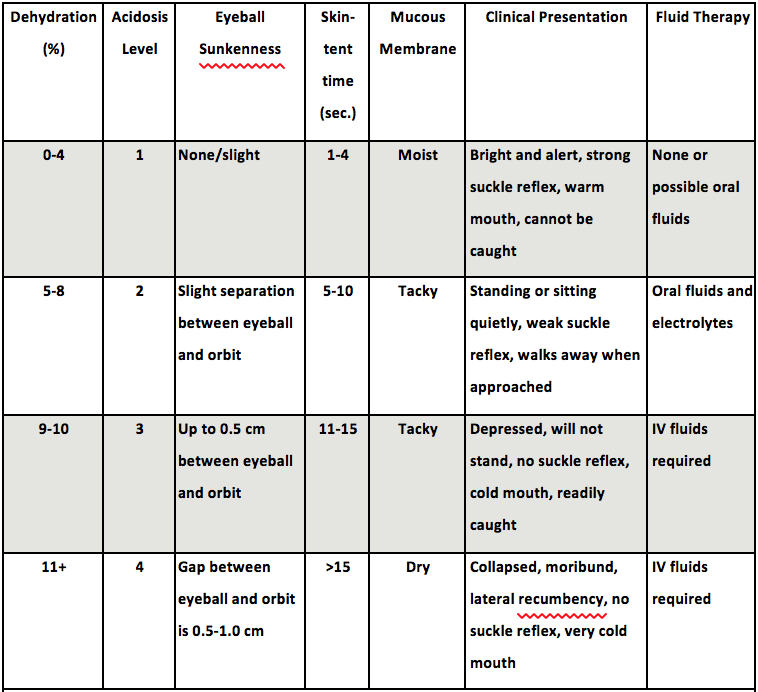By Janna Kincheloe SDSU Extension Research Associate II
For many cattle producers, this time of year means sleepless nights, partly due to checking cows during calving and partly due to the worries that come after calves are safely on the ground. Calf scours, the common term for neonatal calf diarrhea, is one of the primary health problems in baby calves. The USDA National Animal Health Monitoring System (NAHMS) reported in a 2007-08 study that 14% of losses in calves less than three weeks old were due to digestive problems such as calf scours.
What Causes Scours?
Scours cases typically can be blamed on infectious agents (bacteria such as E. coli and Salmonella, viruses such as rotavirus and coronavirus, or protozoan parasites such as Cryptosporidia and coccidia). Even so, management-related issues play a large role in allowing these organisms to affect calves. These issues include inadequate nutrition of the dam – leading to poor colostrum quality and quantity, and wet cool weather, which results in cold stress for the calf and good survival conditions for scours-causing germs. Because there is such a long list of factors that contribute to this ailment, it is often difficult to pinpoint one single intervention that will eliminate the problem. Producers should consult their veterinarian in order to select effective treatment options and to help develop management strategies to prevent future scours outbreaks.
Dehydration & Electrolyte Loss
The loss of water and electrolytes from scours causes dehydration and alters the acid-base balance of body fluids. Oral fluid replacement using a calf feeder should be the initial method used to restore water and electrolytes in a calf with diarrhea. A variety of dry electrolyte powders are available that can be mixed with water for oral administration. These products contain sources of minerals, energy, and buffers in the correct proportion to sufficiently address the needs of the calf. Solutions that contain acetate or propionate as buffers are preferred over solutions using bicarbonate. These solutions should be fed separately from milk. Calves should be encouraged to nurse (or fed by hand) during treatment since they need the protein and energy supplied by milk to effectively fight off the infection. When calves show clinical signs that indicate severe (greater than 8% dehydration; Table 1), oral electrolytes may not be sufficient, and intravenous (IV) fluid therapy will be necessary. Most dehydrated calves will also suffer from hypothermia, and may need to be placed in a hot box or under a heat lamp during treatment.
Table 1. Clinical signs used to detect dehydration in calves with Calf Scours (Kahn and Cottle, 2014)
Other Considerations
Severe scours outbreaks are often associated with bad weather conditions and storms. Since weather conditions are often unpredictable, a clean, dry place for calves early in life is very important. Calving areas should be separate from standard wintering areas in order to reduce the incidence of bacteria and other infectious agents. Consumption of sufficient colostrum within hours of birth is extremely important in ensuring immunity against the various infectious diseases that cause scours (See The Colostrum Conversation and Colostrum Supplements and Replacers). A broad-spectrum scours vaccine given to pregnant heifers and cows up to 16 weeks prior to calving and again within 4 weeks prior to calving will build antibodies in the colostrum to protect against pathogens that may cause scours. However, a vaccination program alone cannot prevent the incidence of scours due to poor sanitation, inadequate nutrition and facilities, and poor calving management. These are all critical components in preventing disease and ensuring a healthy calf crop.
A Note From BioZyme
There is no doubt that scours can have a profound impact on an operation’s success during calving season. Therefore, calf health protocols are pivotal to the profitability of any cow-calf operation. Receiving the proper nutrition from the beginning will ensure calves have a strong start and continue to maximize their performance through their lifetime. BioZyme has developed a line of products that specifically address the nutritional needs of an animal experiencing stress, such as scours.
Vita Charge® can be a convenient and effective treatment to help prevent and treat calf scours. Vita Charge comes in a variety of easy to administer forms (gel, liquid, dispersible powder) to support digestive health and promotes feed and water intake during times of stress and recovery. These products provide an elevated dose of B-vitamins to encourage intake; while Amaferm® multiplies good bacteria in the calf’s stomach to aid in digestion and nutrient absorption. In addition to vitamins, minerals and Amaferm, two Vita Charge Stress Tubs and Vita Charge Liquid Boost contain MOS. MOS is a feed additive derived from a specific strain of yeast and promotes increased animal performance through improved gastrointestinal health and integrity. MOS binds to pathogens, such as E. coli and Salmonella (bacterial causes of scours), and keeps them from attaching to the animal’s digestive tract and causing sickness and decreased performance.
We recommend giving Vita Charge anytime there could be or is an increased level of stress. By combining high quality nutritional components with proven additives such as Amaferm and MOS, producers can rest easy at night knowing they are prepared to prevent and treat sickness such as scours if it occurs.





1 thought on “Calf Scours: Causes, Signs, Prevention, and Management”